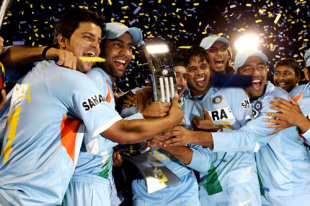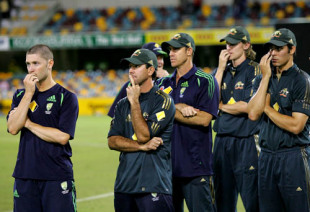
|

'Indian cricket has found its voice'
© Getty Images
|
|
Over the years India has been colonised, scorned and patronised. Inevitably, the hackles of its more abrasive citizens have periodically been raised. Always the struggle is between earnest reformers and rankled revolutionaries. It can happen on battlefields, in newspapers, on sports grounds, in the spirit and in the mind: the rallying of human attachment. Only the greatest of men, amongst them Mahatma Gandhi and Nelson Mandela, have been able to keep the past in its place the better to stride unencumbered towards the future. Even these mighty leaders have not always been able to take their people with them.
And then comes the settling of scores. In some respects the recent series down under was such a settling, but to a much higher degree it was an assertion of fearlessness. India looked Australia in the eye and did not blink. And the look told not of temporary passion but serious intent.
By and large India has done extraordinarily well over the last 60 years. From the chaos of Partition, from the demonstrations and the slaughter, has come an enduring nation that commands respect, a country that has retained its independence in Independence. Although outbreaks occur here and there, for fools and hotheads cannot be abolished by decree, India is intact. Still it plays the game of the coloniser, a game once described as an Indian game accidentally invented by the English, an amusing conceit that shows cricket's adaptability.
To the chagrin of some, but through economic inevitability, India has become the dominant force in the game, a circumstance that has released its entire character, warts and all. Nothing builds confidence half as well as power. Suddenly India has no need to sue for grace for it carries a big stick. It must only realise that the time has come to talk quietly. India does not need to protest about anything. Its task now is to apply the rule of law and to advance the principles of justice, especially those espoused by the American philosopher John Rawls, for none takes such care of the underdog. Above all, Indian officials must read Animal Farm, with all its attendant warnings.
Nowhere was the changing of the guard more apparent than in the recent campaign down under. Always the true test comes when the champion steps into the ring, for then bluff is called and shallowness exposed. India arrived expecting to win. It was not a question of mere fragile hope. Nor did the various turbulences distract them from their purpose. To the contrary the Indians answered every slight with one of their own, joined every argument and added a few of their own making.
| |
|
|
|
| |
| That India ended the campaign in better shape than it began confirms the impression of a nation whose time has come. It is idle to pretend that cricket does not tell us something about the state of a nation. To the contrary it offers a window into the minds of a people |
| |
Australia is a land of fires, droughts, floods, flies, kangaroos and koalas. Even the birds have bright plumage and make a lot of noise. It is not sensible to expect its cricketers or newspapers to tiptoe around like characters in an Edwardian play. It is a place that crushes the spirit or enhances it.
That India ended the campaign in better shape than it began confirms the impression of a nation whose time has come. It is idle to pretend that cricket does not tell us something about the state of a nation. To the contrary it offers a window into the minds of a people.
Of course sport serves other purpose as well. Nowadays it provides entertainment to all sections of society. Formerly it was regarded more as a craft than an adventure. Opening batsmen were not expected to hit boundaries in the first hour. These days they are supposed to strike three in the opening over. Twenty-over cricket has risen from the need to entertain. History suggests that popular culture does not threaten so much as sustain the high-brow. In any case, even Test cricket has awoken from its slumber. Standing warily behind a blocking bat or sending down dibblers with a ring field no longer serves the purpose. Cricket survives not because it has merit but because it has a market.
Competition is another part of sport's attraction. Men and women relish the chance to push themselves to the limit, enjoy pitting themselves against each other. Satisfaction of the sort obtained from a superb round of golf, or a last-gasp winner is hard to find. Sportsmen also relish sitting in the rooms afterwards, all energy spent, skill released, divisions erased (unless Harbhajan Singh and Matthew Hayden have been playing), and only the reckoning remaining.
Yet the most significant role of sport is as an expression of the energies, talents and culture of a school, group, village, city, province and country. Cricket is an expression of culture and the clashes at the SCG reached into the depths of Indian and Australian self-knowledge. It turned out to be a battle between equals. The players looked each other in the eye. India did not blink. Indeed, the visitors looked fresher by the end. Meanwhile the Australians suffered more mysterious withdrawals as Brad Hogg and Shaun Tait followed Damien Martyn into the paddock.
Australia has always played cricket by its own lights. Turning its back on English customs, it developed its own approach founded upon an egalitarian outlook that endures (the captain is a hard nut from the backwaters of a forgotten island). Yearning for action, resisting melancholia, Australian sportsmen must attack. Latent insecurity and loathing of cant is demonstrated in a suspicion of walkers, and walking, and a willingness to abide by the umpire's decision. And so Australian cricket forged its own path forwards, formed its own ideology. India has never been as clear-minded about itself. Whereas the Australian settlers had an almost empty continent on which to create a nation, India had proud memories of itself, traditions recorded in books or burned into minds - attitudes and customs strong enough to survive any empire. But hundreds of years of foreign influence were bound to leave their mark besides which no nation can stand still. Since 1947 India has been rediscovering itself. Of course the same applies on the cricket field and the triumph of 2007-08 lay not so much in the results as in the sense that an identity had been found.

|

'Indeed, the visitors looked fresher by the end'
© Getty Images
|
|
Under the admirable captaincies of Anil Kumble and Mahendra Dhoni, India discovered a new, contemporary voice. Too much has been made of the various episodes involving Harbhajan. More significant has been the way the Test team fought back in Perth, and the manner in which Dhoni's men took the ODI finals. India was not broken on the wheel, was not affected by the local noise, did not take a step backwards. In short, it met the Australians on equal terms, as an united force.
The Indian team expressed the confidence of a nation. Forget about the raptures and furies. Consider the last over of the campaign. Australia needed 13 runs to win. Already Sachin Tendulkar had played another beautiful innings. Already Dhoni had played boldly and thought fearlessly, summoning an unsung swing bowler from a family of wrestlers, and a teenage legspinner, and throwing them the ball at critical times. Now he tossed the ball to Irfan Pathan, put his arm around him and muttered not the usual platitudes but a cheerful, "Irfan, you cannot be so bad that you give away 13 runs in the last over." Afterwards Pathan told TV reporter Vimal Kumar that he had not felt the pressure as he had grown up seeing his father trying to put food on the table. That was pressure. Dhoni had grown up the same way, fighting for his place. It is also the Australian way. And who was Kumar except a boy from the rural areas who has risen through the ranks? Ishant Sharma's dad repairs air conditioners.
Indian cricket has found its voice. Not that the inheritance has been abandoned, for that is childish. Rather it has been interpreted and renewed. Australian cricket had always belonged to the people. Now the same applies to India. Australia had been crying for an opponent that plays cricket with sustained intent. The rivalry between the nations, Australia with its 108 years and India with its 60, both with booming economies, has just begun.
Peter Roebuck is a former captain of Somerset and the author, most recently, of In It to Win It

